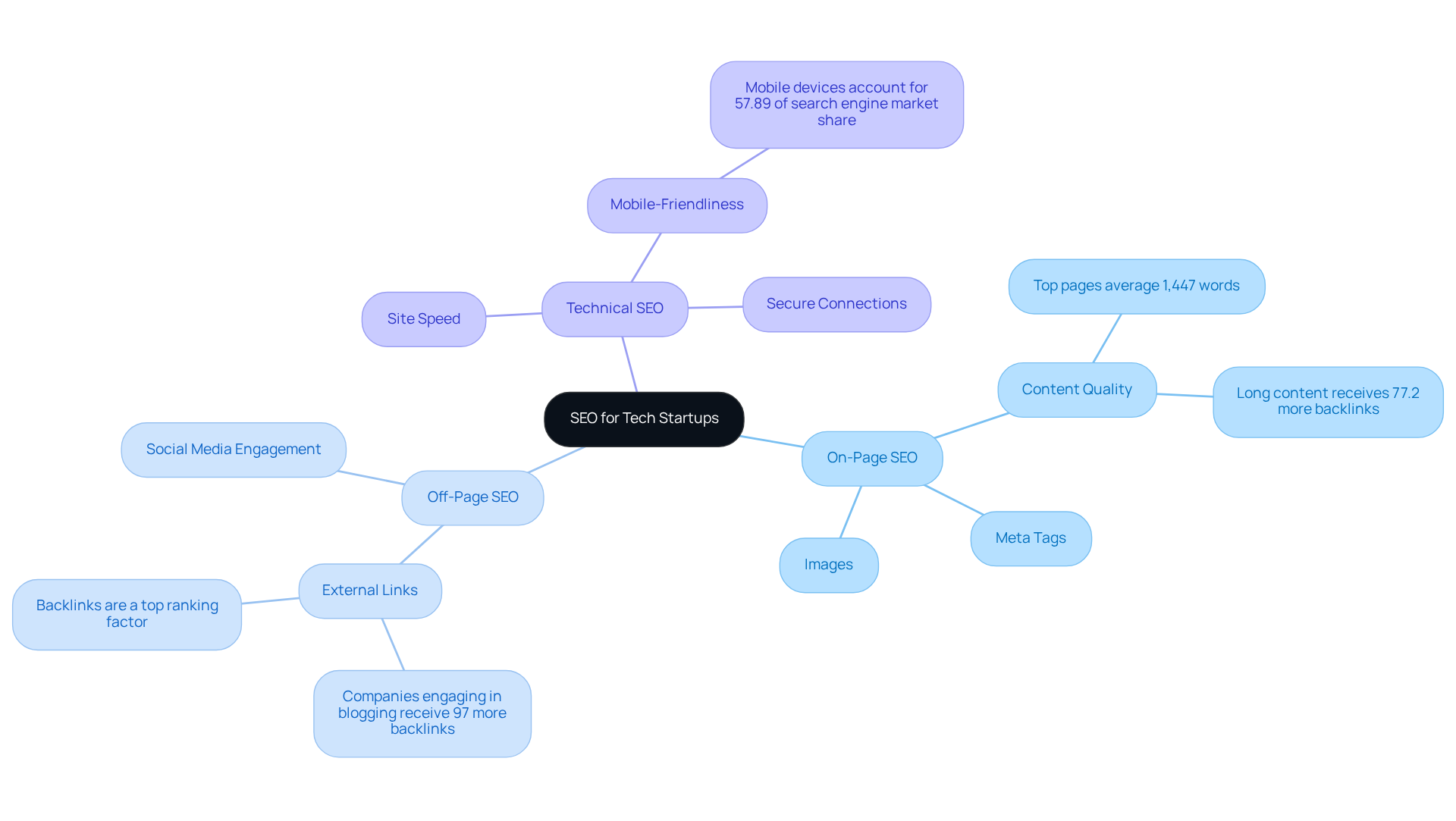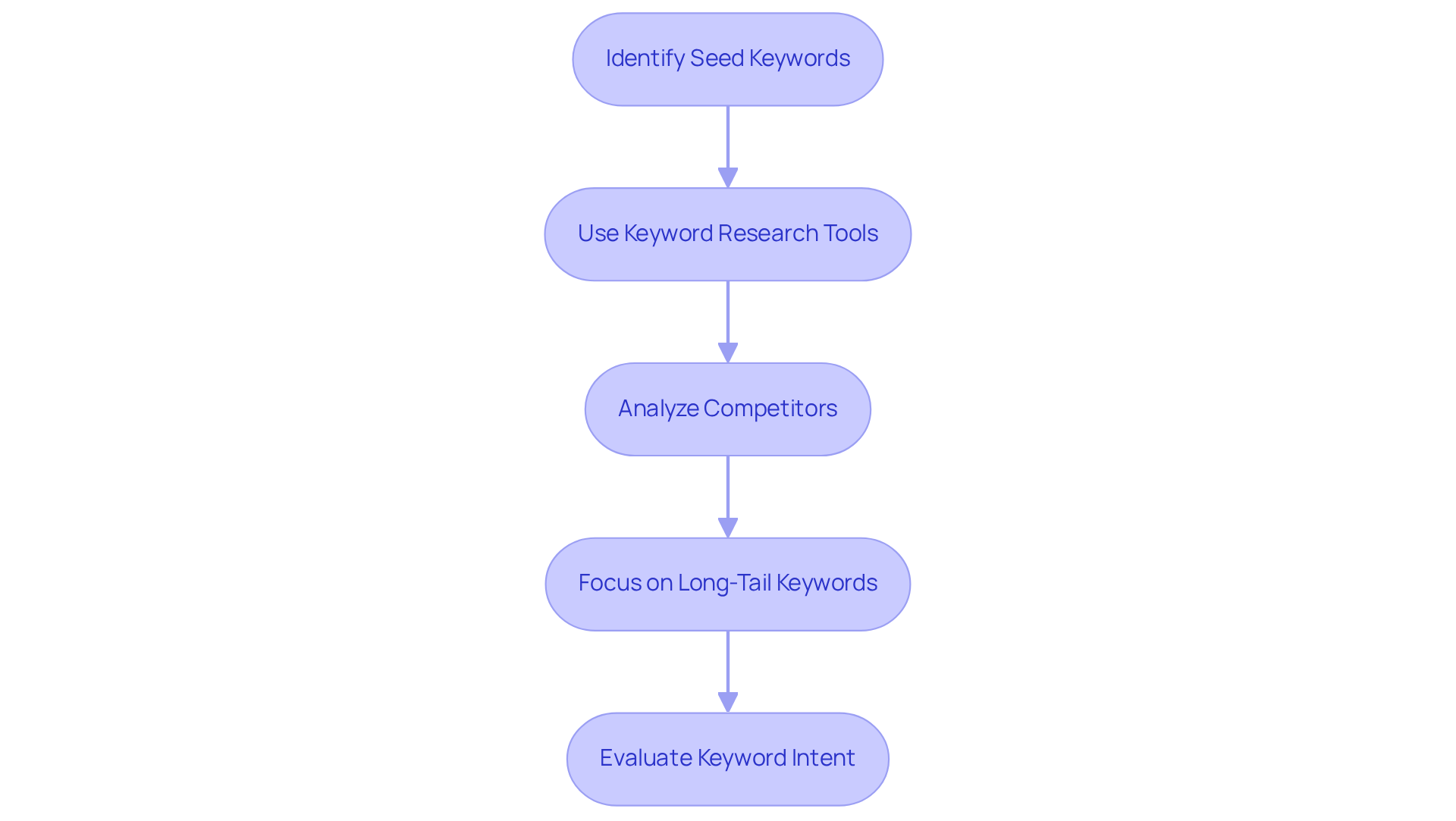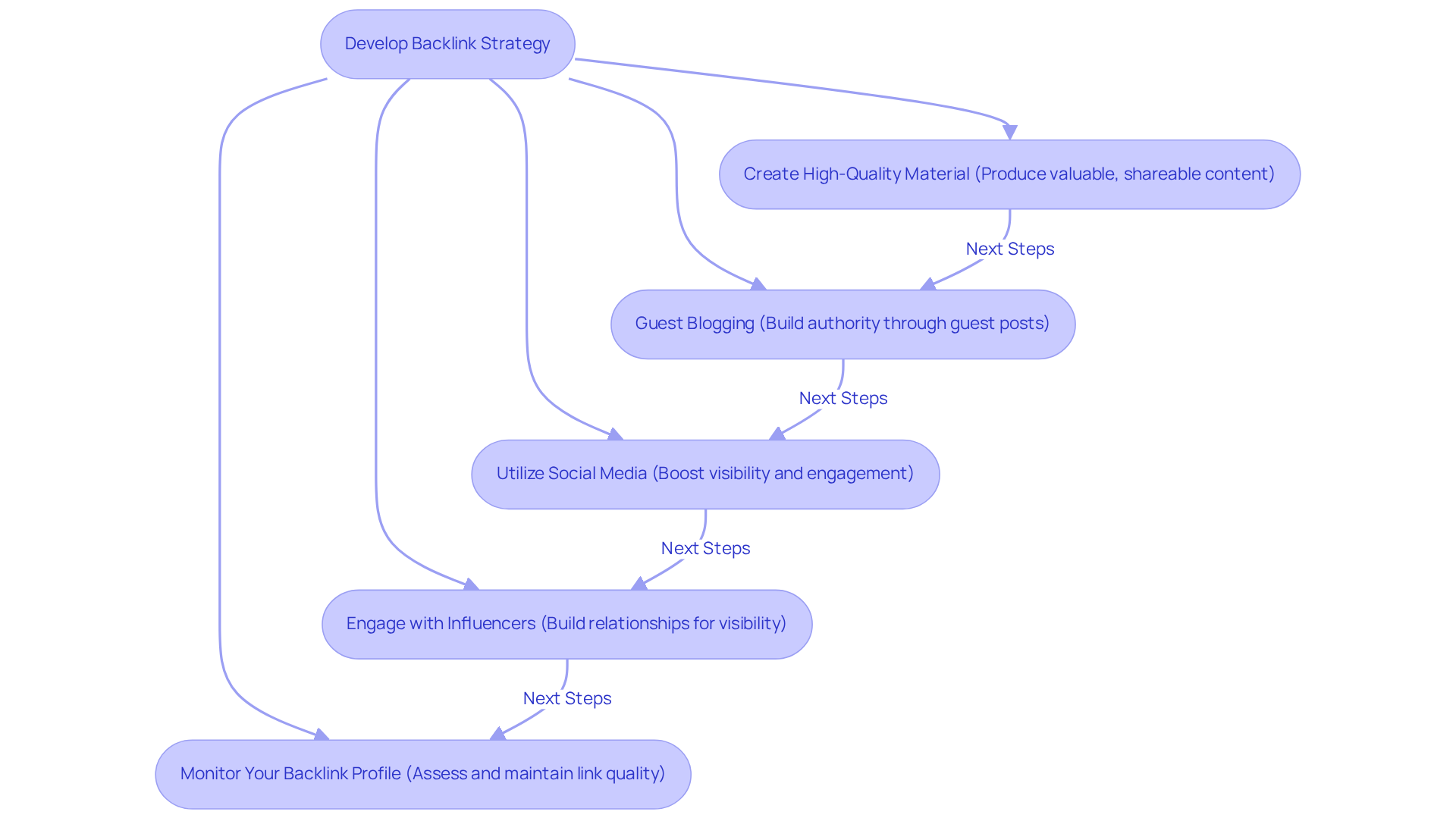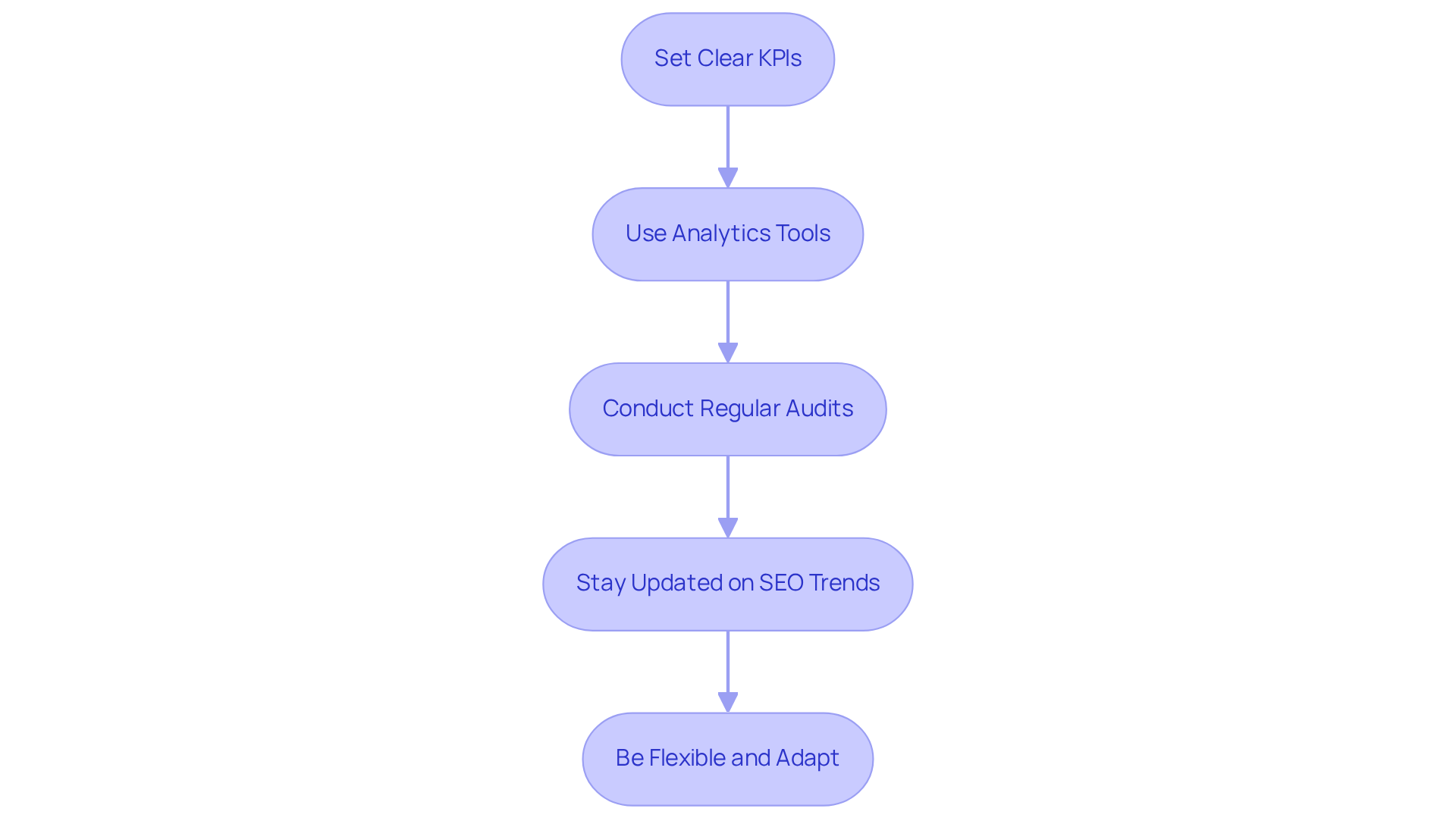Overview
Navigating the world of SEO can feel overwhelming for tech startup founders. You might find yourself grappling with the complexities of on-page, off-page, and technical SEO strategies, all while trying to conduct effective keyword research and build a strong backlink profile. It’s a lot to handle, and it’s understandable to feel a bit lost in the process.
The implications of not mastering these strategies can be significant. Without a solid grasp of SEO, your online visibility may suffer, making it harder to establish authority in your niche. This can lead to missed opportunities for customer acquisition, especially when you consider that organic leads often convert at much higher rates than outbound leads. It’s frustrating to think about how much potential you might be leaving on the table.
But there’s hope! By focusing on these essential components of SEO, you can enhance your online presence and connect with your audience more effectively. At RNO1, we understand the unique challenges you face, and we’re here to support you in developing a robust SEO strategy tailored to your needs. Together, we can navigate this journey and help your startup thrive in the digital landscape.
Introduction
Search Engine Optimization (SEO) can feel like a daunting mountain to climb for tech startups eager to boost their online visibility and connect with potential customers. It’s understandable—after all, leads generated from search engines come with a remarkable conversion rate of 14.6%. The pressure is on for those who wish to flourish in today’s competitive digital landscape. Yet, many founders find themselves wrestling with the intricacies of SEO, from mastering on-page elements to crafting effective backlink strategies.
Have you ever felt overwhelmed by the complexities of SEO? You’re not alone. Many startup founders share this struggle, feeling the weight of their ambitions as they navigate these challenges. It’s not just about understanding the technical aspects; it’s about the fear of missing out on opportunities that could propel their business forward.
But here’s the good news: there are ways to tackle these challenges head-on. This guide is designed to walk you through essential SEO techniques tailored specifically for startups. We’ll provide you with actionable insights that can transform your customer acquisition efforts, helping you unlock the full potential of your online presence. Together, we can navigate this journey and turn those daunting SEO challenges into stepping stones for success.
Understand the Basics of SEO for Tech Startups
Search Engine Optimization (SEO) can feel overwhelming for tech startups trying to boost their online visibility and connect with potential customers who are actively searching for solutions. It’s a common struggle, and understanding SEO is crucial because leads from search engines convert at an impressive rate of 14.6%, compared to just 1.7% for outbound leads (HubSpot). Let’s explore how mastering SEO can truly transform your customer acquisition efforts.
On-Page SEO is where it all begins. Think of it as fine-tuning each page on your website. You’ll want to focus on elements like content quality, meta tags, and images. When done right, effective on-page strategies can elevate your rankings. Did you know that pages in the top 10 results on Google average about 1,447 words? This highlights the importance of comprehensive content that resonates with your audience.
Then there’s Off-Page SEO. This involves actions taken outside your website to enhance its authority, primarily through creating external links. It’s fascinating to note that companies that engage in blogging receive 97% more backlinks, which can significantly enhance your visibility in search engines. Sharing your insights and experiences can not only help others but also build your credibility.
Don’t overlook Technical SEO either. This aspect focuses on the behind-the-scenes elements of your website, like site speed, mobile-friendliness, and secure connections. With mobile devices making up 57.89% of the entire search engine market share, ensuring a seamless mobile experience is vital for attracting and keeping visitors.
Moreover, 91% of marketers have reported that SEO positively impacts their website performance and marketing goals. Even more encouraging, 59% have seen an increase in ROI from their SEO efforts (Statista). By mastering how to optimize SEO for website fundamentals, tech startups can lay a strong foundation for their digital marketing strategies, positioning themselves effectively in a competitive landscape.
Remember, you’re not alone in this journey. Embracing SEO can feel daunting, but with the right support and resources, you can navigate these challenges and thrive. Let’s work together to build your online presence and connect with the customers who need your solutions.

Conduct Effective Keyword Research
Conducting effective keyword research can feel overwhelming, especially for tech startup founders who are juggling multiple responsibilities. You might find yourself wondering where to start or how to ensure your efforts yield the best results. Let’s explore this together, so you can navigate the process with confidence.
-
Identify Seed Keywords: Start with broad terms that resonate with your business. If you’re in the AI space, think about keywords like 'AI technology' or 'machine learning'. This foundational step is crucial; it sets the direction for your research and helps you feel grounded in your approach.
-
Use Keyword Research Tools: Tools like Google Keyword Planner, Ahrefs, or SEMrush can be your best friends in expanding your keyword list. They provide valuable insights into average search volume, competition levels, and related keywords. In 2025, the average search volume for AI-related keywords is projected to be significant, making these tools essential for identifying high-potential terms. Did you know that 58% of marketers are currently using AI for keyword research? This can streamline your process and enhance accuracy, giving you peace of mind.
-
Analyze Competitors: Take a moment to investigate the keywords your competitors rank for. This analysis can reveal gaps in your strategy and highlight valuable keywords you might have overlooked. Understanding where your competitors stand can empower you to carve out your own niche in the market.
-
Focus on Long-Tail Keywords: Embrace longer, more specific phrases that often come with lower competition and higher conversion rates. Instead of just targeting 'AI', consider something like 'best AI solutions for small businesses'. As digital strategist Dave Chaffey wisely points out, 'Any SEO worth their salt will tell you it's long-tail keyword territory where you can make the biggest incremental gains.' These long-tail keywords can attract more qualified traffic, leading to better engagement and conversion.
-
Evaluate Keyword Intent: It’s essential to ensure that your chosen keywords align with the intent of your target audience. Are they looking for information, or are they ready to make a purchase? Understanding this intent is key to directing your content strategy and ensuring that your offerings truly meet user needs.
By following these steps, you can effectively identify and target the right keywords, significantly improving how to optimize SEO for your website and driving organic traffic. Remember, considering mobile optimization is crucial too, as mobile interactions currently drive over 40% of revenue in surveyed B2B organizations. You’re not alone in this journey; with the right strategies, you can thrive.

Develop a Backlink Strategy to Enhance Authority
Building a successful backlink strategy can feel overwhelming, especially for tech startup founders who are already juggling numerous responsibilities. You might find yourself wondering how to optimize SEO for your website to effectively attract links that can elevate your online presence. The good news is that there are actionable steps you can take to ease this burden and foster growth.
-
Create High-Quality Material: Start by producing valuable, shareable content that naturally draws in links. Think about in-depth guides, engaging infographics, or original research. These types of materials not only provide substantial value but also have a higher chance of being referenced by others. In fact, AI-generated content has a 40% greater likelihood of acquiring links compared to non-AI content, underscoring the importance of quality in your efforts.
-
Guest Blogging: Consider reaching out to reputable blogs within your industry to offer guest posts. This strategy not only helps you build backlinks but also establishes your authority in the field. Many marketers—53%, to be exact—believe that guest posting is the most effective method for link building. By sharing your insights through guest blogging, you can significantly enhance your brand's visibility and credibility, making it a vital strategy for tech startups.
-
Utilize Social Media: Don’t underestimate the power of social media. Distributing your materials across these platforms can boost visibility and encourage others to link back to your content. Engaging with your audience on social media not only broadens your reach but also opens doors to potential connections.
-
Engage with Influencers: Building relationships with industry influencers can be a game-changer. When these individuals share your content or link to your site in their articles, it can lead to increased visibility and valuable connections. Think of it as a nurturing partnership that benefits both parties.
-
Monitor Your Backlink Profile: Regularly check your backlink profile using tools like Moz or Ahrefs. It’s essential to assess the quality of your links and disavow any low-quality ones that could harm your SEO. Remember, inbound links account for about 14% of your SEO power, so maintaining a healthy profile is crucial for your success.
By implementing these strategies, you can understand how to optimize SEO for your website and enhance your online authority along with improving your search engine rankings. High-quality content is key to attracting links, and guest blogging serves as a powerful tool for establishing expertise in the tech field. However, be cautious of low-quality backlinks or spammy link farms, as these can tarnish your brand's reputation and SEO efforts. As you plan your budget, keep in mind that the average cost for acquiring a backlink in 2024 ranges from under $100 to over $1000.
Remember, you’re not alone in this journey. Many founders face similar challenges, and by sharing experiences and strategies, we can support one another in navigating the complexities of building a strong online presence.

Monitor and Adapt Your SEO Strategy Regularly
Navigating the world of SEO can feel overwhelming, especially for tech startup founders who are juggling multiple responsibilities. You might find yourself wondering if your efforts are truly paying off. The pressure to keep up with ever-changing algorithms and user expectations can be daunting. It’s not just about driving traffic; it’s about ensuring that traffic converts into meaningful engagement and growth.
To ease this burden, let’s explore some nurturing steps you can take to effectively monitor and adapt your SEO strategy:
-
Set Clear KPIs: Start by defining key performance indicators (KPIs) that resonate with your goals. Think about organic traffic, bounce rates, and conversion rates. These metrics will help you measure your SEO success and give you a clearer picture of where you stand.
-
Use Analytics Tools: Embrace tools like Google Analytics and Google Search Console. They’re not just technical jargon; they’re your allies in tracking your website's performance and understanding user behavior. These insights can illuminate the path forward.
-
Conduct Regular Audits: Make it a habit to periodically review your website for SEO issues. Look out for broken links, slow loading times, and mobile optimization problems. Addressing these issues can significantly enhance user experience and satisfaction.
-
Stay Updated on SEO Trends: The SEO landscape is always shifting. By following industry blogs and updates from search engines, you can stay informed about changes that might impact your strategy. This knowledge empowers you to adapt proactively.
-
Be Flexible and Adapt: Based on your findings, be ready to adjust your keywords, content, and overall strategy. Aligning with user intent and market trends is crucial for maintaining relevance and effectiveness.
By consistently monitoring and adapting your SEO efforts, you can discover how to optimize SEO for your website, alleviating some of the stress while maintaining a competitive edge. Remember, you’re not alone in this journey. Many tech startups face similar challenges, and by sharing experiences and insights, we can foster a supportive community that thrives together.

Conclusion
Mastering SEO can feel overwhelming for tech startups striving to boost their online visibility and connect with potential customers. It’s a common challenge, and many founders share the frustration of feeling lost in the digital landscape. But understanding and implementing effective SEO strategies can truly make a difference. By doing so, startups can significantly enhance their chances of attracting leads that convert, ultimately driving growth and success in a competitive environment.
Key insights from this guide reveal the importance of:
- On-page SEO: This is all about optimizing content quality and structure, ensuring that what you share resonates with your audience.
- Off-page SEO: This emphasizes building authority through backlinks and external engagement, which can feel daunting but is essential for credibility.
- Technical SEO: This ensures that your website is user-friendly and accessible across devices, making it easier for potential customers to find you.
Conducting thorough keyword research, leveraging long-tail keywords, and developing robust backlink strategies are vital steps that can lead to improved search rankings and increased organic traffic.
In conclusion, embracing SEO isn’t just a technical necessity; it’s a strategic advantage for tech startups. By continuously monitoring and adapting your SEO strategies, you can remain agile and responsive to market changes, ensuring sustained growth and engagement. The journey may seem daunting, but with the right tools and insights, you can confidently navigate the SEO landscape. Remember, you’re not alone in this; many have walked this path and emerged stronger, establishing a strong online presence that truly resonates with their target audience.
Frequently Asked Questions
Why is SEO important for tech startups?
SEO is crucial for tech startups because leads from search engines convert at a rate of 14.6%, significantly higher than the 1.7% conversion rate for outbound leads. Mastering SEO can transform customer acquisition efforts.
What is On-Page SEO?
On-Page SEO involves optimizing individual pages on your website by focusing on elements such as content quality, meta tags, and images. Effective on-page strategies can elevate your website's rankings in search results.
How long should content be for optimal SEO?
Pages that rank in the top 10 results on Google typically average about 1,447 words, indicating the importance of comprehensive content that resonates with your audience.
What is Off-Page SEO?
Off-Page SEO refers to actions taken outside of your website to enhance its authority, primarily through creating external links. Engaging in blogging can lead to 97% more backlinks, enhancing visibility in search engines.
What is Technical SEO?
Technical SEO focuses on the behind-the-scenes aspects of your website, such as site speed, mobile-friendliness, and secure connections. Ensuring a seamless mobile experience is vital, as mobile devices account for 57.89% of search engine market share.
What impact does SEO have on website performance?
91% of marketers report that SEO positively impacts their website performance and marketing goals, with 59% noting an increase in ROI from their SEO efforts.
How can tech startups successfully implement SEO?
By mastering the fundamentals of SEO, tech startups can lay a strong foundation for their digital marketing strategies, effectively positioning themselves in a competitive landscape.




